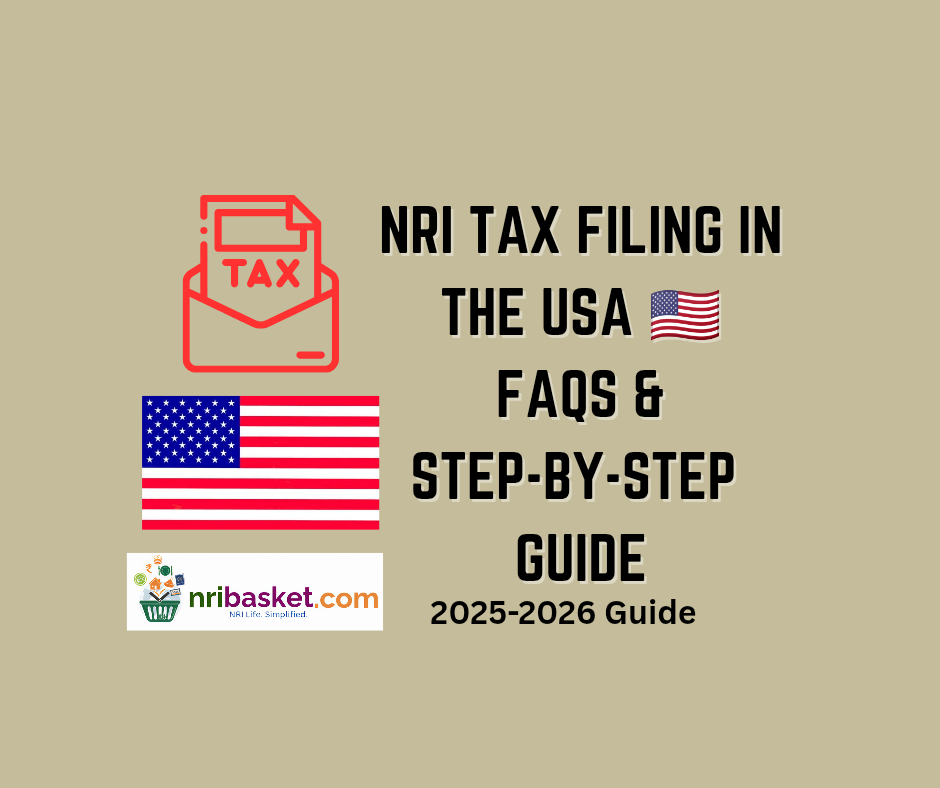
nri tax filing USA
NRI Tax Filing in the USA – Complete FAQ & Step-by-Step Guide
For Indians living in the USA, tax filing can often feel complicated due to different visa types, income sources in both India and the US, and IRS rules. This guide explains everything NRIs in the USA need to know about filing taxes – from residency tests, required forms, deductions, deadlines, to common mistakes to avoid.
Step-by-Step Guide to NRI Tax Filing in the USA
- Check if you are a Resident Alien or Non-Resident Alien using the Substantial Presence Test.
- Collect required documents: W-2, 1099 forms, Indian income proofs, bank account statements.
- Identify the correct IRS form: Form 1040NR (Non-Resident) or Form 1040 (Resident).
- If you hold foreign bank accounts, check if you need to file FBAR or FATCA disclosures.
- Apply for DTAA (Double Taxation Avoidance Agreement) relief if applicable.
- File tax return by April 15 (extensions till October 15 are possible).
- Pay pending taxes online via IRS portal or authorized agents.
- Maintain records for at least 6 years for compliance.
NRI Tax Filing in the USA – Frequently Asked Questions
Long Answer: If you earn income from employment, freelancing, business, rent, or investments in the USA, you must file taxes. If you qualify as a “Resident Alien,” you must also report your global income including income earned in India.
Long Answer: The IRS uses the Substantial Presence Test to check how many days you’ve stayed in the US over 3 years. If you meet the formula (183-day rule), you are considered a Resident Alien and must pay taxes on worldwide income.
Long Answer: Non-Resident Aliens usually file Form 1040NR, while Resident Aliens file Form 1040. Additional forms may apply if you have investments, foreign income, or claim treaty benefits.
Long Answer: Non-Resident Aliens report only US income. Resident Aliens must report worldwide income, including salary, rent, or interest earned in India, though DTAA relief may apply.
Long Answer: If your foreign bank account balances exceed $10,000 at any time in a year, you must file the FBAR (Foreign Bank Account Report). This is mandatory even if the money/">money is in India.
Long Answer: The Foreign Account Tax Compliance Act (FATCA) requires US residents to disclose foreign financial assets above certain thresholds. Resident Aliens must report Indian bank accounts, mutual funds, or insurance policies if limits are crossed.
Long Answer: Most H1B holders pass the Substantial Presence Test and are taxed as Resident Aliens. They must file Form 1040 and report worldwide income, but can claim DTAA relief to avoid double taxation.
Long Answer: Resident Aliens can claim standard deductions, itemized deductions (mortgage, medical, donations), and child tax credits. Non-Resident Aliens may have limited deductions depending on treaty benefits.
Long Answer: If an NRI is married to a US citizen or Resident Alien, they can choose to file jointly. This often reduces tax liability. If both are Non-Resident Aliens, joint filing is not allowed.
Long Answer: To claim the Child Tax Credit, your child must have a valid Social Security Number (SSN). Without it, you cannot claim this deduction even if you support the child financially.
Long Answer: The IRS imposes late filing penalties, interest on unpaid taxes, and in severe cases, bans or visa complications. Failure to report foreign accounts under FBAR/FATCA can result in heavy fines.
Long Answer: If too much tax was withheld from your salary or investments, you can receive a refund after filing your return. Refunds are processed faster if you file electronically and provide a US bank account.
Long Answer: The Double Taxation Avoidance Agreement ensures that income is not taxed in both India and the USA. For example, salary earned in the US is taxed only in the US, while Indian interest income may be taxed in India but offset in US filings.
Long Answer: Non-Resident Aliens who don’t qualify for a Social Security Number must apply for an Individual Taxpayer Identification Number (ITIN) to file US taxes or claim treaty benefits.
Long Answer: If you are a Resident Alien, rental income from Indian property must be reported in the US. You may pay tax in India but can claim credit in the USA under DTAA rules. Non-Resident Aliens do not report Indian income.
Long Answer: Capital gains from selling Indian property are taxed in India. If you are a US tax resident, you must also report it to the IRS. DTAA rules prevent double taxation by allowing credit for taxes paid in India.
Long Answer: Indian Chartered Accountants can help with Indian returns, but for IRS compliance, you need a US CPA or enrolled agent experienced with NRI tax issues and DTAA filings.
Long Answer: You can file online through IRS e-file, certified tax software, or a CPA. Electronic filing is faster, safer, and ensures quicker refunds compared to paper filing.
Long Answer: The standard deadline is April 15 each year. If you need more time, you can file for an automatic extension till October 15, but interest on unpaid tax continues to accrue.
Long Answer: If you paid taxes in India, you may claim a Foreign Tax Credit in your US return to reduce double taxation. You must provide proof such as Indian Form 16 or tax payment receipts.
Long Answer: W-8BEN is used by Non-Resident Aliens to claim reduced tax withholding rates under tax treaties. If you earn US dividends, royalties, or freelance income, this form ensures correct tax deduction.
Long Answer: If you invest in US stocks, ETFs, or mutual funds, capital gains and dividends are taxable. The rate depends on whether you are a Resident or Non-Resident Alien.
Long Answer: By filing for Foreign Tax Credit or treaty exemption, you can avoid paying tax on the same income twice. Proper documentation is required for both countries.
Long Answer: If you give up US residency/visa, you no longer file as a Resident Alien. But if you have US income sources (investments, property), you must still file as a Non-Resident Alien each year.
Long Answer: The IRS can audit returns up to 6 years old. If fraud is suspected, there is no time limit. Always keep income proofs, Indian tax receipts, and FBAR filings safely stored.
Long Answer: Students on F1 visas are considered Non-Resident Aliens for 5 years. They must file Form 1040NR even if they earned no income, just to report their presence in the USA.
Long Answer: If you are not eligible for an SSN, apply for an ITIN using Form W-7. This allows you to file taxes, claim refunds, and comply with IRS rules.
Long Answer: Not filing FBAR or FATCA when required can lead to fines ranging from $10,000 to 50% of the account value. Voluntary disclosure programs may reduce penalties if you correct mistakes quickly.
Long Answer: If you made mistakes or missed foreign income, you can file an amended return using Form 1040X. This helps avoid penalties if corrected before IRS action.
Long Answer: Many CPAs and tax firms specialize in NRI taxes, DTAA filings, FBAR, and dual-country compliance. Professional advice ensures you save money and stay penalty-free.




